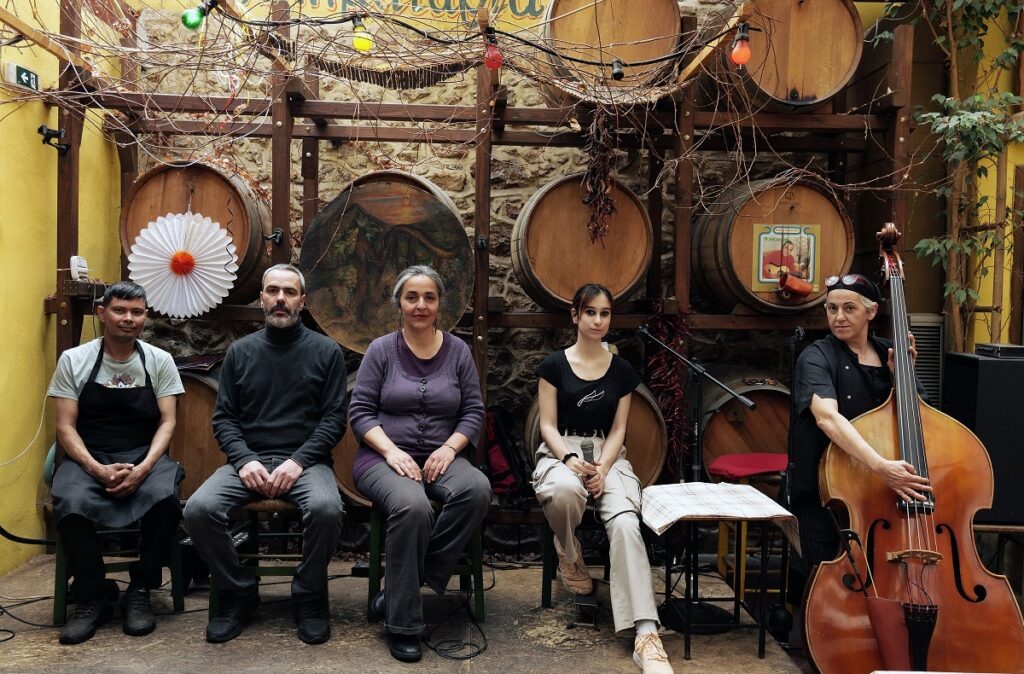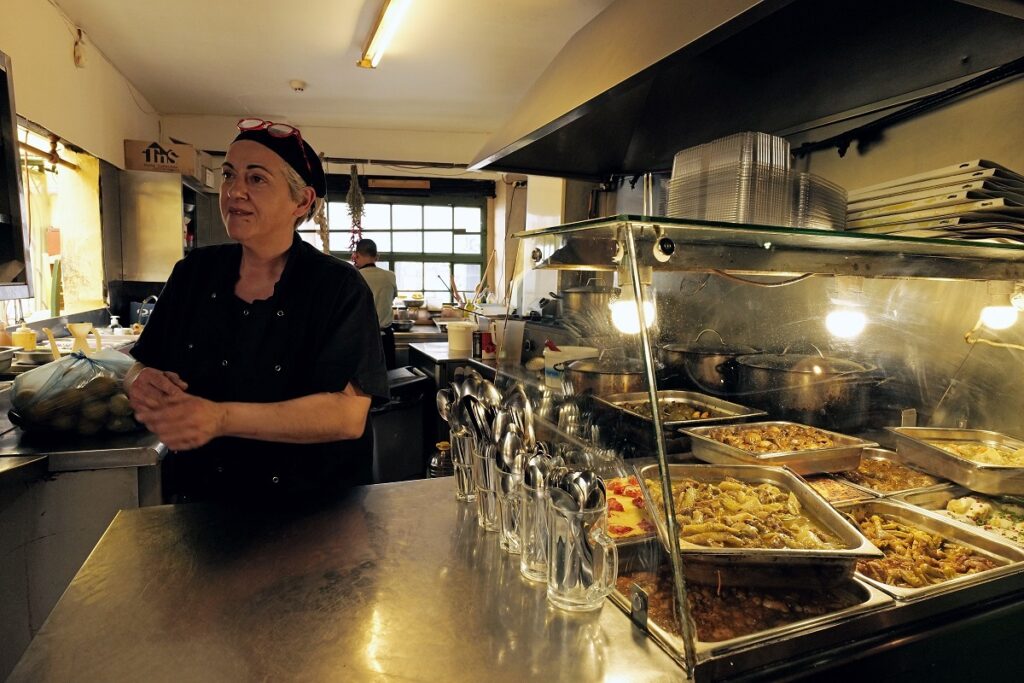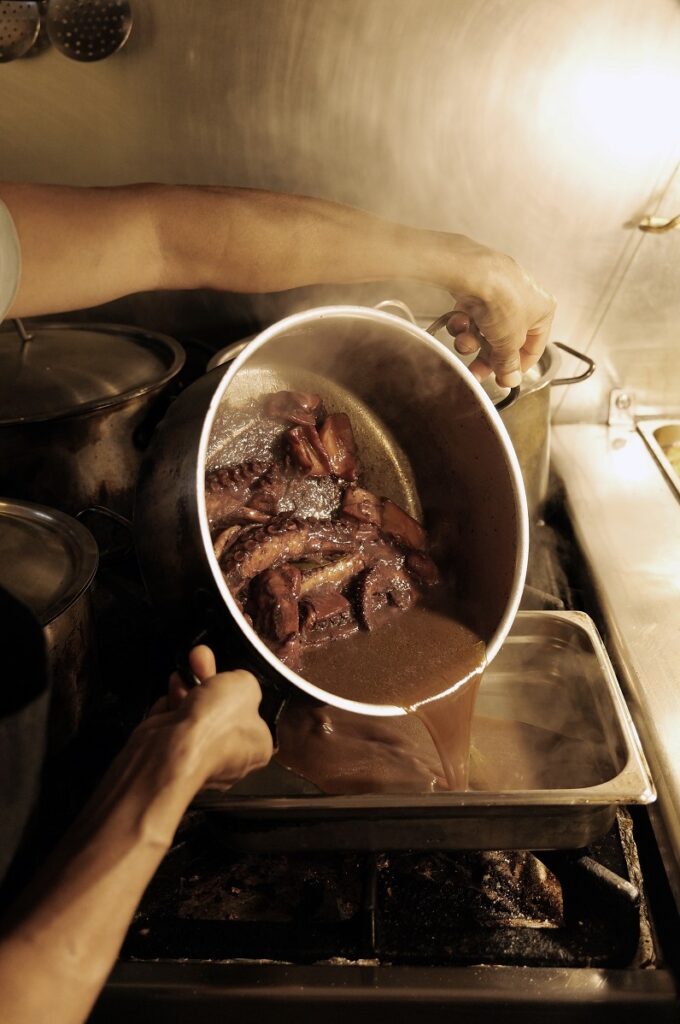Klimataria, which has served delicious food in the historic centre of Athens since 1927, resists culinary and neo-restaurant challenges. The owner continues cooking delicious food, singing, and giving Greek and foreign visitors history lessons.
Some shops in the historical centre of Athens have shaped the city and its history. Plateia Theatrou is surrounded by tall buildings and is located next to the Diplarios School. Klimataria is a ground-floor bright yellow building in an area that is run-down but constantly full of people.
Klimataria is located next to the city’s first covered theatre. It was originally a cafe for St. Ioannis church ceremonies, but in 1927, it was converted into a winery named “Klimataria.”
Merchants, travellers, and fellow artisans could eat fasolada, herring, anchovies, and other delicacies there, and wine flowed abundantly from the oak barrels.
In the evenings, Klimataria becomes a place of entertainment. The music of Markos Vamvakaris and George Papaioannou can be heard.

“For me, Klimataria is a living organism and often makes its own decisions,” said Maria Siotou, the current owner.
Indeed, it cannot continue without music. After all, the small stage dominates the most central part of the taverna. That’s why, three days a week, The Famous Trio melodically accompanies the food.
Maria started here as a waitress and saw all the phases—not only of the taverna but also of the local area.
“My family is from Imvros, and three generations ago, my grandmothers cooked in Constantinople. I believe this is where I found myself karmically. Again, I work with my family: my brother, my husband, my nieces and the people in and out of the kitchen, who are also family,” Maris said.
“So many hours and days, so many years. You can’t have a good restaurant or delicious dishes if there is no love. The area here has suffered, that’s the truth, but this shop has always been a beacon,” she added.

The flame that enveloped Klimataria in the early morning of July 23, 2005, marked a new beginning. Although the renovation was necessary, the taverna’s fundamental values and authentic atmosphere remained intact.
The icon painter Rigas, with absolute respect for the shop’s history and aesthetics, revived its colours and aura, giving it new life and freshness without betraying its authenticity.
“No, we didn’t give up. We pulled together and did everything to reopen as soon as possible,” said Maria.
In the kitchen, Gianna and Nirom have lit the famous cauldrons at the shop’s entrance early on, and the smoke from the chimney envelops the square with delicious smells, including leavened bread baked in their oven.
Extra virgin olive oil is everywhere, and there is a choice of raw materials and fresh fish every day.
“Those are non-negotiables here. Otherwise, I’d rather not do this job. My task becomes even more difficult due to the price of olive oil, but I do not mess with quality. We love this job, and in addition to earning a living, it is also a hobby,” says Maria.

At Klimataria’s tables, you can see people of all ages and nationalities. A tourist from the Netherlands who has just landed in Athens sits a table in front of me, and this is the first restaurant on his travel list.
Like a secret culinary agent, I watch him poke around a table under the barrels.
What does he order? Okra! I approach him and ask: “[You travelled] so far for… okra?”.
“Certainly! We don’t even have this vegetable, so it’s like eating sushi for the first time,” he replies.
It is one in the afternoon, and he has just arrived. He wants to explore, and what better than okra with feta and bread?!
Older customers certainly and eagerly want legumes and vegetables. Most of them are not fasting. But the Greek youth? Okra?
“Okra, gigandes, celery ala polita, and gemista. These go first, especially at noon when they want something light. Pies are also very popular—both vegetable pie and onion pie. People have moved away from meat, and many customers don’t eat meat anymore. We make everything for everyone,” she said.
Everyone wants delicious food, and that will always be the point. As long as the tavernas manage to offer delectable dishes, these “places of happiness” will remain beacons.
Info: 2 Plateia Theatrou, tel. 210 3216629
Lefteris Trigas is a columnist for Cantina. Translated by Paul Antonopoulos.
READ MORE: To Kafeneiou Tou Rizou: An old-fashioned but new-era urban cafe in Athens.







